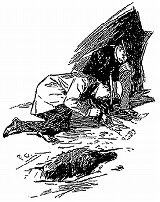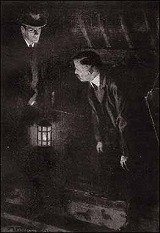“You will not apply my precept,” he said, shaking his head. “How often have I said to you that when you have eliminated the impossible, whatever remains, however improbable, must be the truth? We know that he did not come through the door, the window, or the chimney. We also know that he could not have been concealed in the room, as there is no concealment possible. When, then, did he come?”
“He came through the hole in the roof!” I cried.
“Of course he did. He must have done so. If you will have the kindness to hold the lamp for me, we shall now extend our researches to the room above - the secret room in which the treasure was found.”
He mounted the steps, and, seizing a rafter with either hand, he swung himself up into the garret. Then, lying on his face, he reached down for the lamp and held it while I followed him.
The chamber in which we found ourselves was about ten feet one way and six the other. The floor was formed by the rafters, with thin lath and plaster between, so that in walking one had to step from beam to beam. The roof ran up to an apex and was evidently the inner shell of the true roof of the house. There was no furniture of any sort, and the accumulated dust of years lay thick upon the floor.
“Here you are, you see,” said Sherlock Holmes, putting his hand against the sloping wall. “This is a trapdoor which leads out on to the roof. I can press it back, and here is the roof itself, sloping at a gentle angle. This, then, is the way by which Number One entered. Let us see if we can find some other traces of his individuality?”

He held down the lamp to the floor, and as he did so I saw for the second time that night a startled, surprised look come over his face. For myself, as I followed his gaze, my skin was cold under my clothes. The floor was covered thickly with the prints of a naked foot - clear, well-defined, perfectly formed, but scarce half the size of those of an ordinary man.

“Holmes,” I said in a whisper, “a child has done this horrid thing.”
He had recovered his self-possession in an instant.
“I was staggered for the moment,” he said, “but the thing is quite natural. My memory failed me, or I should have been able to foretell it. There is nothing more to be learned here. Let us go down.”
“What is your theory, then, as to those footmarks?” I asked eagerly when we had regained the lower room once more.
“My dear Watson, try a little analysis yourself,” said he with a touch of impatience. “You know my methods. Apply them, and it will be instructive to compare results.”
“I cannot conceive anything which will cover the facts,” I answered.
“It will be clear enough to you soon,” he said, in an offhand way. “I think that there is nothing else of importance here, but I will look.”
He whipped out his lens and a tape measure and hurried about the room on his knees, measuring, comparing, examining, with his long thin nose only a few inches from the planks and his beady eyes gleaming and deep-set like those of a bird. So swift, silent, and furtive were his movements, like those of a trained bloodhound picking out a scent, that I could not but think what a terrible criminal he would have made had he turned his energy and sagacity against the law instead of exerting them in its defence. As he hunted about, he kept muttering to himself, and finally he broke out into a loud crow of delight.
“We are certainly in luck,” said he. “We ought to have very little trouble now. Number One has had the misfortune to tread in the creosote. You can see the outline of the edge of his small foot here at the side of this evil-smelling mess. The carboy has been cracked, you see, and the stuff has leaked out.”